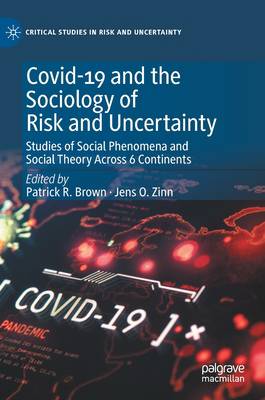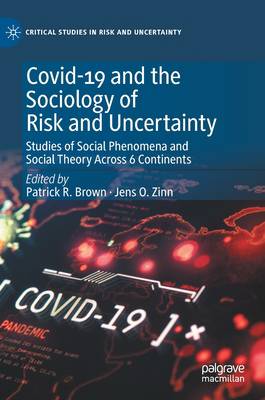
- Retrait gratuit dans votre magasin Club
- 7.000.000 titres dans notre catalogue
- Payer en toute sécurité
- Toujours un magasin près de chez vous
- Retrait gratuit dans votre magasin Club
- 7.000.0000 titres dans notre catalogue
- Payer en toute sécurité
- Toujours un magasin près de chez vous
Covid-19 and the Sociology of Risk and Uncertainty
Studies of Social Phenomena and Social Theory Across 6 Continents
158,45 €
+ 316 points
Description
This book provides a global perspective on COVID-19, taking the heterogenous realities of the pandemic into account. Contributions are rooted in critical social science studies of risk and uncertainty and characterized by theoretical approaches such as cultural theory, risk society theory, governmentality perspectives, and many important insights from 'southern' theories.
Some of the chapters in the book have a more theoretical-conceptual emphasis, while others are more empirically oriented - but all chapters engage in an insightful dialogue between the theoretical and the empirical, in order to develop a rich, diverse and textured picture of the new challenge the world is facing and responding to. Addressing multiple levels of responses to the coronavirus, as understood in terms of, institutional and governance policies, media communication and interpretation, and the sense-making and actions of individual citizens in their everyday lives, the book brings together a diverse range of studies from across 6 continents. These chapters are connected by a common emphasis on applying critical theoretical approaches which help make sense of, and critique, the responses of states, organisations and individuals to the social phenomena emerging amid the Corona pandemic.Spécifications
Parties prenantes
- Editeur:
Contenu
- Nombre de pages :
- 332
- Langue:
- Anglais
- Collection :
Caractéristiques
- EAN:
- 9783030951665
- Date de parution :
- 26-05-22
- Format:
- Livre relié
- Format numérique:
- Genaaid
- Dimensions :
- 148 mm x 210 mm
- Poids :
- 566 g

Les avis
Nous publions uniquement les avis qui respectent les conditions requises. Consultez nos conditions pour les avis.





